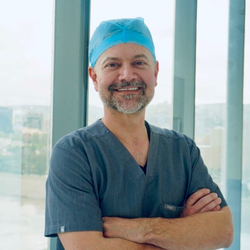Considering significant weight loss and a healthier future? Mini-Gastric Bypass (MGB) surgery is a highly effective bariatric procedure, and Tijuana, Mexico, has become a prominent destination for patients seeking quality, affordable care. This guide aims to answer your most pressing questions about Mini-Gastric Bypass in Tijuana, helping you understand the procedure, its benefits, costs, and what to expect from your medical journey to Mexico. We'll delve into what makes Tijuana a popular choice for MGB and how to navigate your options for a successful outcome.
Mini-Gastric Bypass surgery in Tijuana offers a simplified yet powerful alternative to traditional Roux-en-Y gastric bypass, often with comparable or even superior weight loss results and a reduced risk of certain complications. It's designed to help you achieve substantial and sustainable weight loss by restricting food intake and reducing nutrient absorption. Many patients choose Tijuana for its experienced surgeons, modern facilities, and significantly lower costs compared to the US, Canada, or Europe, without compromising on the quality of care. Let's explore the details.
What is the average cost of Mini-Gastric Bypass in Tijuana?
"The average cost of Mini-Gastric Bypass in Tijuana, Mexico, typically ranges from $4,500 to $7,500 USD. This price often includes the surgeon's fees, hospital stay, anesthesia, and some pre- and post-operative care."
This cost is considerably lower than in the United States, where the same procedure can range from $15,000 to $30,000 or more. The package price for MGB in Tijuana often covers:
Surgeon's fees
Anesthesiologist's fees
Hospital fees (including operating room and recovery room charges)
Pre-operative tests (blood work, EKG, etc., if done on-site)
Medications administered during the hospital stay
Post-operative consultations (often virtual)
Sometimes, ground transportation from a nearby airport (e.g., San Diego) and hotel accommodations for a portion of the stay are included.
It's crucial to get a detailed breakdown of what is included in the quoted price to avoid unexpected expenses. Factors influencing the final cost can include the surgeon's experience, the specific hospital or clinic, the length of the hospital stay, and any additional medical needs.
What exactly is a Mini-Gastric Bypass?
"A Mini-Gastric Bypass (MGB) is a type of bariatric surgery that creates a long, narrow stomach pouch and connects it to the small intestine, bypassing a significant portion of the stomach and the initial segment of the small intestine to reduce food intake and nutrient absorption, leading to weight loss."
The Mini-Gastric Bypass, sometimes called the "single anastomosis gastric bypass" or "omega loop gastric bypass," is a procedure that combines restrictive and malabsorptive elements. First, the surgeon divides the stomach to create a smaller, tube-shaped pouch. This new, smaller stomach can only hold a small amount of food, which helps you feel full sooner and eat less (restriction). Next, a loop of the small intestine (usually about 150-250 cm from its starting point) is brought up and connected to this new stomach pouch. This bypasses a considerable length of the small intestine where calories and nutrients are normally absorbed, leading to fewer calories being utilized by the body (malabsorption).
The MGB is generally considered technically simpler and quicker to perform than the traditional Roux-en-Y Gastric Bypass (RNYGB). It involves only one new connection (anastomosis) between the stomach and the small intestine, compared to two connections in the RNYGB. This simplicity can contribute to a shorter operating time and potentially fewer early complications.
How is Mini-Gastric Bypass different from traditional Gastric Bypass (Roux-en-Y)?
"The main difference is that Mini-Gastric Bypass (MGB) involves creating one connection (anastomosis) between the new stomach pouch and the small intestine, forming a loop, while the traditional Roux-en-Y Gastric Bypass (RNYGB) creates two connections, involving a Y-shaped re-routing of the intestine."
While both MGB and RNY Gastric Bypass aim for significant weight loss through stomach restriction and intestinal bypass, their surgical construction differs. The RNY procedure involves creating a small stomach pouch and then dividing the small intestine into two limbs: the "Roux limb" (or alimentary limb), which is connected to the stomach pouch, and the "biliopancreatic limb," which carries digestive juices and is reconnected to the alimentary limb further down. This "Y" configuration gives it its name.
In contrast, the Mini-Gastric Bypass in Tijuana creates a longer, narrower pouch and directly connects a loop of the small intestine to it. This single anastomosis (connection) is often seen as a simplification that may reduce operative time and some specific complications like internal hernias, which can be more common with RNYGB. Some studies suggest MGB offers comparable, if not slightly better, long-term weight loss and resolution of comorbidities like type 2 diabetes, with potentially lower rates of certain complications. However, MGB can have a higher risk of bile reflux into the stomach pouch for some individuals.
Why should I consider Tijuana for my Mini-Gastric Bypass surgery?
"Tijuana is a popular choice for Mini-Gastric Bypass surgery due to its significantly lower costs compared to countries like the US, Canada, or the UK, experienced bariatric surgeons, modern medical facilities, and proximity to the United States, making travel convenient."
Tijuana has established itself as a leading hub for medical tourism, particularly for bariatric surgery Mexico. Several factors contribute to its appeal:
Cost-Effectiveness: The most significant driver is the price. Weight loss surgery Tijuana can be 50-70% cheaper than in the U.S. without a compromise in quality when performed by reputable providers. This includes surgeon fees, hospital stays, and often pre-operative and post-operative consultations.
Experienced Surgeons: Many surgeons in Tijuana specializing in MGB are highly trained, often with fellowships or training in the US or Europe. They typically have performed thousands of bariatric procedures.
Modern Facilities: Reputable hospitals and surgical centers in Tijuana are equipped with state-of-the-art technology and adhere to international standards of care. Many cater specifically to international patients.
Accessibility: For North American patients, Tijuana's location just across the U.S. border (near San Diego, California) makes it easily accessible by car or a short flight. Many clinics offer transportation services from the San Diego airport.
Shorter Wait Times: Unlike in some countries with public healthcare systems where wait times for bariatric surgery can be extensive, qualified patients can often schedule their Mini-Gastric Bypass in Tijuana much more quickly.
Is Mini-Gastric Bypass surgery in Tijuana safe?
"Yes, Mini-Gastric Bypass surgery in Tijuana can be very safe when performed by qualified, experienced surgeons in accredited medical facilities. Many Tijuana bariatric centers adhere to international safety standards and have a strong track record."
Safety is a primary concern for anyone considering medical procedures abroad. When it comes to weight loss surgery Tijuana, the safety and quality of care can be comparable to that in Western countries, provided you do thorough research and choose a reputable provider. Look for surgeons who are board-certified (Mexican board certification is common, and some may have international affiliations), have extensive experience specifically with MGB, and operate in hospitals or clinics that are well-equipped and possibly internationally accredited (e.g., by JCI or other recognized bodies).
Reading patient testimonials, checking before-and-after photos, and having direct consultations (even virtual ones) with potential surgeons can also help gauge the quality of care. While any surgery carries risks, choosing a high-volume, experienced bariatric center in Tijuana significantly mitigates these risks.
Who is a good candidate for Mini-Gastric Bypass surgery in Tijuana?
"A good candidate for Mini-Gastric Bypass in Tijuana typically has a Body Mass Index (BMI) of 40 or higher, or a BMI of 35 or higher with significant obesity-related health conditions like type 2 diabetes, sleep apnea, or hypertension, and is committed to long-term lifestyle changes."
General criteria for MGB candidacy include:
BMI: As stated, a BMI ≥ 40, or ≥ 35 with comorbidities. In some cases, individuals with a BMI of 30-34.9 with severe comorbidities might be considered.
Previous Weight Loss Attempts: Candidates have usually tried and failed to achieve significant, sustained weight loss through diet and exercise alone.
Understanding of the Procedure: The patient must understand the surgery, including its risks, benefits, and the necessary lifelong dietary and lifestyle adjustments.
Psychological Stability: Candidates should be psychologically stable and prepared for the changes surgery will bring. Some clinics may require a psychological evaluation.
Commitment to Follow-Up: A willingness to adhere to post-operative dietary guidelines, vitamin supplementation, and long-term medical follow-up is crucial.
No Contraindications: Certain medical conditions might make the surgery too risky. These include severe heart or lung disease, active substance abuse, or uncontrolled psychiatric disorders.
Each patient is evaluated individually by the bariatric team in Tijuana to determine their suitability for Mini-Gastric Bypass.
What are the primary benefits of undergoing a Mini-Gastric Bypass?
"The primary benefits of Mini-Gastric Bypass include significant and sustained weight loss, improvement or resolution of obesity-related health conditions (like type 2 diabetes, hypertension, sleep apnea), enhanced quality of life, and potentially a simpler surgical procedure compared to traditional gastric bypass."
Patients who undergo MGB surgery can experience a multitude of positive changes:
Significant Weight Loss: Most patients lose 60-80% of their excess body weight within the first 12-24 months.
Resolution of Comorbidities:
Type 2 Diabetes: MGB often leads to rapid improvement or remission of type 2 diabetes, sometimes even before significant weight loss occurs.
Hypertension: Blood pressure often normalizes or significantly improves.
Hyperlipidemia: Cholesterol and triglyceride levels can improve.
Obstructive Sleep Apnea: Many patients experience complete resolution.
Joint Pain: Reduced body weight lessens stress on joints.
Improved Quality of Life: Increased mobility, better mood, improved self-esteem, and enhanced social interactions are commonly reported.
Increased Longevity: By reducing obesity and related diseases, MGB can contribute to a longer, healthier life.
Potentially Shorter Operative Time: Compared to RNYGB, the MGB procedure is often quicker.
What are the potential risks and complications associated with Mini-Gastric Bypass?
"Potential risks and complications of Mini-Gastric Bypass include infection, bleeding, blood clots, staple line leaks, ulcers, malnutrition, vitamin deficiencies, and bile reflux. While serious complications are rare with experienced surgeons, all surgery carries inherent risks."
It's important to be aware of the potential downsides. While MGB is generally safe, complications can occur, similar to any major surgery. These can be categorized into early (short-term) and late (long-term) complications:
Early Complications:
Staple Line Leak: A serious complication where digestive fluids leak from the staple line.
Bleeding: Can occur internally or at incision sites.
Infection: Wound infections or internal infections.
Blood Clots: Deep Vein Thrombosis (DVT) or Pulmonary Embolism (PE).
Anesthesia-related complications.
Late Complications:
Bile Reflux Gastritis/Esophagitis: The loop design of MGB can sometimes lead to bile flowing back into the stomach pouch or esophagus, causing inflammation. This is one of the more debated aspects of MGB, though its incidence varies.
Marginal Ulcers: Ulcers can form at the connection between the stomach pouch and the small intestine, especially in smokers or those taking NSAIDs.
Anemia and Vitamin/Mineral Deficiencies: Due to malabsorption, lifelong supplementation of iron, calcium, vitamin B12, vitamin D, and other micronutrients is essential to prevent deficiencies.
Dumping Syndrome: Caused by rapid passage of sugary or fatty foods into the small intestine, leading to nausea, cramping, diarrhea, dizziness, and sweating.
Internal Hernia: Less common with MGB than RNYGB, but still a possibility.
Gallstones: Rapid weight loss can increase the risk of developing gallstones.
Choosing an experienced Mini-Gastric Bypass Tijuana surgeon and adhering strictly to pre- and post-operative guidelines can significantly minimize these risks.
How much weight can I expect to lose after a Mini-Gastric Bypass in Tijuana?
"Patients undergoing Mini-Gastric Bypass in Tijuana can typically expect to lose between 60% to 80% of their excess body weight, with most of this loss occurring within the first 12 to 18 months post-surgery."
Excess body weight is calculated by subtracting your ideal body weight from your current weight. For example, if your current weight is 250 lbs and your ideal weight is 150 lbs, your excess body weight is 100 lbs. With MGB, you could expect to lose 60 to 80 lbs.
The actual amount of weight lost varies depending on several factors, including:
Starting BMI: Patients with higher initial BMIs may lose more total pounds.
Adherence to Dietary Guidelines: Following the post-op diet is crucial.
Exercise Levels: Incorporating regular physical activity enhances weight loss and muscle preservation.
Individual Metabolism and Genetics:
Commitment to Lifestyle Changes: Long-term success is tied to sustained healthy habits.
It's important to focus not just on the number on the scale, but also on improvements in health, mobility, and overall well-being that accompany weight loss surgery Tijuana.
What is the recovery process like after Mini-Gastric Bypass surgery in Tijuana?
"Recovery after Mini-Gastric Bypass in Tijuana involves a hospital stay of 2-3 days, followed by a period of at-home recovery. Patients typically return to light activities within 1-2 weeks and more strenuous activities within 4-6 weeks, with a gradual progression of diet from liquids to solids over several weeks."
The initial recovery phase in Tijuana will be closely monitored by your surgical team.
Hospital Stay: Usually 2 to 3 nights. You'll be encouraged to walk soon after surgery to prevent blood clots. Pain medication will be provided. You'll start with a clear liquid diet.
Diet Progression: You will follow a strict dietary plan, advancing slowly:
Clear liquids (first few days)
Full liquids (e.g., protein shakes, yogurt) for a couple of weeks
Pureed foods
Soft foods
Gradual return to solid foods (usually around 6-8 weeks post-op)
Activity: Walking is encouraged immediately. Most patients can resume desk jobs and light activities within 1-2 weeks. Strenuous exercise and heavy lifting should be avoided for at least 4-6 weeks, or as advised by your surgeon.
Follow-up: You will have follow-up appointments (often virtual if you've traveled from abroad) and will need regular blood tests to monitor for nutritional deficiencies.
Adherence to the surgeon’s instructions is key for a smooth recovery from MGB.
How long do I need to stay in Tijuana for my Mini-Gastric Bypass procedure?
"Patients typically need to stay in Tijuana for approximately 5 to 7 days for a Mini-Gastric Bypass procedure. This includes pre-operative evaluations, the surgery itself, a 2-3 day hospital stay, and initial recovery monitoring before being cleared for travel."
This timeframe allows for:
Pre-operative Consultations and Tests: Usually 1-2 days before surgery. This involves meeting your surgeon, anesthesiologist, and completing any necessary final tests.
Surgery Day: The procedure itself.
Hospital Recovery: 2-3 nights in the hospital for monitoring.
Initial Post-Operative Recovery: A day or two after hospital discharge, often in a nearby hotel, to ensure you are stable and comfortable enough for travel. Your surgeon will want to see you for a post-operative check before you depart.
Some patients opt to stay longer for a more relaxed initial recovery period, but the minimum recommended stay usually falls within this 5-7 day window for Mini-Gastric Bypass Tijuana.
What kind of pre-operative preparations are required for MGB surgery in Tijuana?
"Pre-operative preparations for Mini-Gastric Bypass in Tijuana typically include a special low-calorie, high-protein diet for 2-4 weeks before surgery to reduce liver size, stopping certain medications (like blood thinners), smoking cessation, and undergoing medical evaluations and tests."
Your surgeon will provide specific pre-operative instructions, which are vital for a safe and successful MGB procedure. These often include:
Pre-operative Diet: A liquid or very low-calorie diet for a few weeks before surgery. This helps shrink the liver, making the surgery safer and technically easier for the surgeon. It also helps kick-start weight loss.
Medication Adjustments: You'll need to inform your surgeon of all medications and supplements you take. Some, like aspirin, NSAIDs (ibuprofen), and blood thinners, will need to be stopped or adjusted before surgery.
Smoking Cessation: If you smoke, you'll be required to quit several weeks or months before surgery, as smoking significantly increases surgical risks and impairs healing.
Medical Clearances: You may need clearances from your primary care physician or specialists (e.g., cardiologist) depending on your health status.
Lab Tests and Imaging: Standard pre-op tests include blood work, EKG, and possibly a chest X-ray or upper endoscopy.
Mental Preparation: Understanding the surgery and committing to the necessary lifestyle changes.
What is the typical post-operative diet after a Mini-Gastric Bypass?
"The post-operative diet after Mini-Gastric Bypass is a phased approach, starting with clear liquids, progressing to full liquids, then pureed foods, soft foods, and finally to regular textured (but healthy) solid foods over approximately 6-8 weeks. Lifelong vitamin and mineral supplementation is also essential."
The post-MGB Mexico diet is carefully structured to allow your new stomach pouch and digestive system to heal and to help you adapt to new eating habits.
Phase 1 (First few days - 1 week): Clear Liquids. Water, broth, unsweetened diluted juice, decaf tea/coffee. Sip slowly.
Phase 2 (1-2 weeks): Full Liquids/Protein Shakes. Sugar-free protein shakes, skim milk, thin soups, sugar-free gelatin. Focus on protein intake.
Phase 3 (2-3 weeks): Pureed Foods. Foods blended to a smooth, baby-food consistency. Examples: pureed lean meats, cooked vegetables, soft fruits, cottage cheese.
Phase 4 (Several weeks): Soft Foods. Foods that are easy to chew and digest. Examples: scrambled eggs, flaked fish, well-cooked vegetables, soft cheeses.
Phase 5 (Around 2 months onwards): Regular Healthy Diet. Gradually introduce more solid foods, focusing on lean protein, vegetables, fruits, and whole grains. Portion control is key. Avoid sugary, fatty, and processed foods.
Throughout all phases, hydration is critical. You'll also need to take prescribed vitamin and mineral supplements for life to prevent deficiencies due to the malabsorptive component of Mini-Gastric Bypass in Tijuana.
What kind of support can I expect after my MGB surgery in Tijuana?
"After MGB surgery in Tijuana, reputable clinics typically offer post-operative support that includes nutritional counseling, follow-up consultations (often virtual for international patients), access to support groups, and guidance on lifestyle adjustments."
Good bariatric programs understand that surgery is just one tool. Long-term success relies on ongoing support. When choosing a provider for Mini-Gastric Bypass Tijuana, inquire about their aftercare services:
Nutritional Guidance: Access to a nutritionist or dietitian specializing in bariatric patients is crucial for adapting to your new dietary needs and ensuring adequate nutrient intake.
Surgeon Follow-Up: Regular check-ins with your surgical team, even remotely via phone or video call, to monitor your progress and address any concerns.
Support Groups: Many clinics facilitate online or local support groups where patients can share experiences, challenges, and successes. This peer support can be invaluable.
Educational Resources: Information on diet, exercise, vitamin supplementation, and managing potential side effects.
Coordination with Local Physicians: Some Tijuana clinics may help coordinate follow-up care with your primary care physician back home, especially for lab work and monitoring.
How do I choose the best surgeon and clinic for Mini-Gastric Bypass in Tijuana?
"To choose the best surgeon and clinic for Mini-Gastric Bypass in Tijuana, research surgeon credentials (board certification, experience with MGB), check clinic accreditations, read patient reviews and testimonials, and have a direct consultation to assess their communication and your comfort level."
Making an informed decision is paramount for a safe and successful weight loss surgery Tijuana experience. Key steps include:
Verify Surgeon Credentials:
Board Certification: Ensure the surgeon is board-certified in Mexico (e.g., by the Mexican Council of General Surgery and the Mexican College of Bariatric and Metabolic Surgery).
Experience: Ask how many MGB procedures they have performed. High volume often correlates with better outcomes.
Specialized Training: Inquire about their bariatric surgery fellowships or specialized training.
Assess Clinic/Hospital Standards:
Accreditation: Look for facilities with national or international accreditations (e.g., JCI, Mexican Ministry of Health approval).
Equipment and Technology: Ensure they use modern surgical equipment and have appropriate emergency care capabilities.
Read Patient Reviews and Testimonials: Look for reviews on independent platforms, forums, and the clinic's website. Consider both positive and negative feedback.
Seek Before-and-After Photos: These can provide a visual representation of the surgeon's work.
Direct Communication: Schedule a consultation (virtual or in-person if possible). Prepare questions about their experience, success rates, complication rates, and approach to aftercare for MGB Mexico. Assess their responsiveness and willingness to answer your questions thoroughly.
Transparent Pricing: Ensure all costs are clearly outlined.
What accreditations should I look for in a Tijuana bariatric clinic?
"When choosing a Tijuana bariatric clinic for Mini-Gastric Bypass, look for accreditations such as those from the Mexican Federal Government (COFEPRIS approval), international bodies like Joint Commission International (JCI) if available, or certifications from bariatric-specific organizations."
Accreditations provide an external validation of a clinic's commitment to quality and safety standards. Key ones include:
COFEPRIS (Federal Commission for the Protection against Sanitary Risks): This is the Mexican equivalent of the FDA in the United States. Clinics and hospitals must have COFEPRIS approval to operate legally.
Mexican General Health Council (Consejo de Salubridad General): This body provides national hospital certification, which is a mark of quality.
Joint Commission International (JCI): This is a highly respected international accreditation. While not all top clinics in Tijuana will have JCI accreditation due to its rigorous and costly process, those that do demonstrate a very high standard of care.
International Bariatric Club (IBC) or similar surgical society memberships: Surgeon membership in recognized bariatric societies can indicate a commitment to ongoing education and best practices.
SRC (Surgical Review Corporation) Accreditations: Look for designations like "Center of Excellence in Metabolic and Bariatric Surgery" if the clinic or surgeon has pursued this US-based accreditation.
Always verify these credentials and accreditations for your chosen Mini-Gastric Bypass Tijuana provider.
What is the long-term success rate of Mini-Gastric Bypass performed in Tijuana?
"The long-term success rate of Mini-Gastric Bypass performed in Tijuana by qualified surgeons is comparable to MGBs performed elsewhere, with patients typically maintaining significant excess weight loss (50-70% or more) and improvement in comorbidities for many years post-surgery, provided they adhere to lifestyle changes."
Long-term success is generally defined by sustained weight loss and resolution or improvement of obesity-related health issues. For MGB, like MGB globally, studies show excellent long-term results. Success is highly dependent on:
Patient Adherence: Lifelong commitment to dietary changes, regular exercise, and vitamin supplementation is the most critical factor.
Quality of Surgery: A well-performed operation by an experienced surgeon sets the foundation.
Post-Operative Support: Ongoing nutritional and medical follow-up helps patients stay on track and manage any late complications.
While some weight regain can occur over several years (as with any bariatric procedure), most MGB patients maintain a substantial portion of their weight loss and continue to experience health benefits long-term. Reputable Mini-Gastric Bypass Tijuana centers often track their patient outcomes and can provide data on their success rates.
What specific questions should I ask my surgeon before committing to MGB in Tijuana?
"Before committing to MGB in Tijuana, ask your surgeon about their specific experience with Mini-Gastric Bypass, their complication rates, what's included in the surgical package, their approach to aftercare and managing potential complications, and details about the hospital facility and anesthesia."
Being well-informed is key. Prepare a list of questions for your consultation:
How many Mini-Gastric Bypass procedures have you performed?
What are your personal complication rates for MGB (e.g., leaks, infections, strictures)?
Are you board-certified in general surgery and bariatric surgery? Where did you receive your training?
Which hospital will the surgery be performed at? What are its accreditations?
What is included in the price of the MGB package? What are potential additional costs?
What type of anesthesia will be used, and who administers it?
What is your protocol for pre-operative preparation?
What does the post-operative follow-up care involve, especially for international patients?
How do you handle potential complications if they arise after I return home?
Can you provide references from past MGB patients?
What are the specific risks and benefits of MGB for me, given my health profile?
What is your policy on revisions if the initial surgery is not successful or if there are late complications like significant bile reflux?
A reputable surgeon for Mini-Gastric Bypass in Tijuana will welcome your questions and provide clear, honest answers.
Ready to explore your options for Mini-Gastric Bypass surgery in Tijuana, Mexico? PlacidWay can help connect you with experienced bariatric surgeons and reputable clinics. Take the next step towards a healthier you – explore PlacidWay today!




















.png)
.png)
.png)







Share this listing